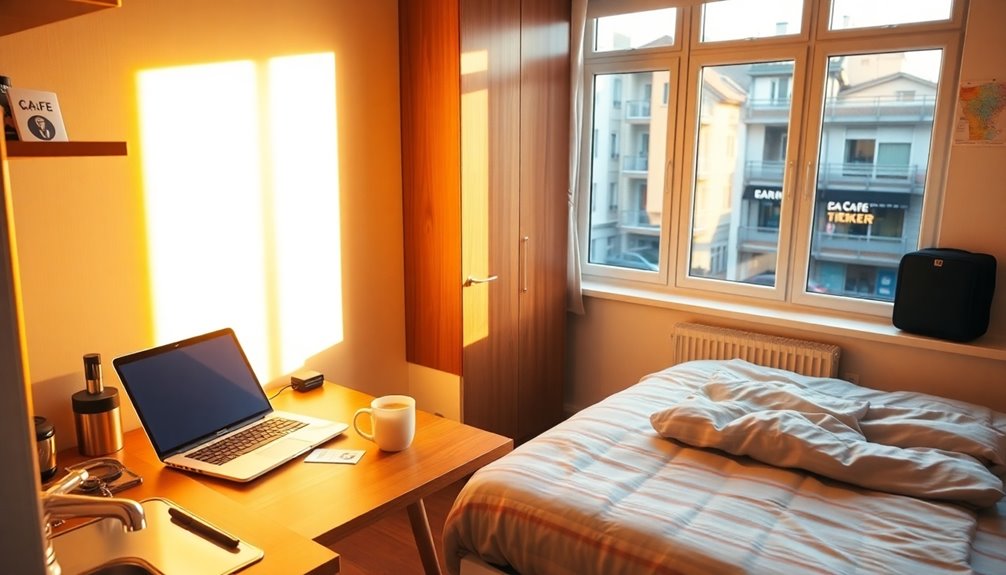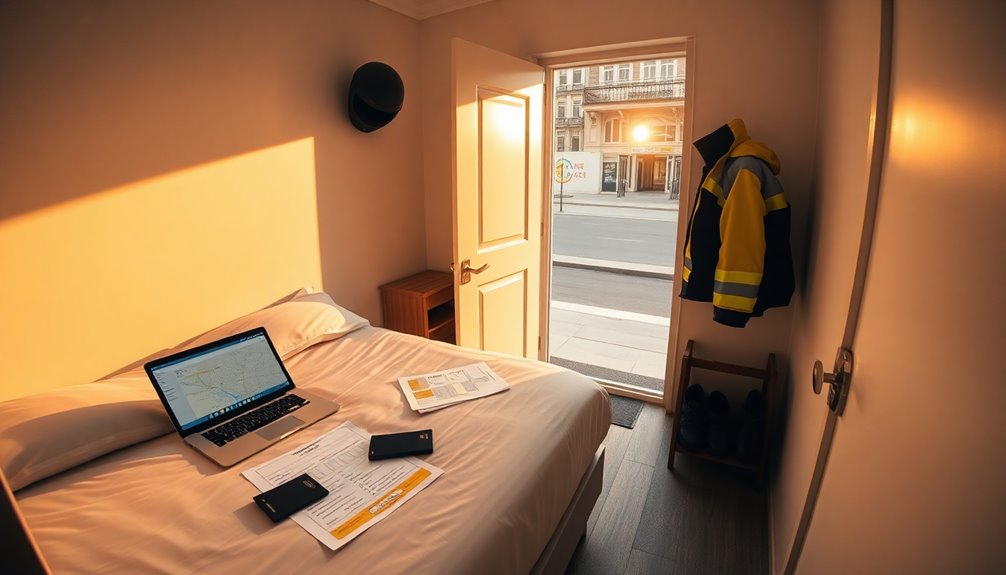
You’ll find a private studio by targeting national listing sites, local letting agents and community groups, using filters for price, short-term options and good Wi‑Fi. Prioritise natural light, a comfy study surface, secure locks and basic cooking/heating. Contact landlords with a brief, polite message, documents ready and flexible viewing times. Ask about extensions, deposits and capped bills, and compare neighbourhood commute times. Keep details written down — keep going to get step-by-step tactics.
Highlights
- Use national property sites with filters for studio, short-term leases, and high-speed Wi‑Fi to narrow suitable options quickly.
- Contact local lettings agents and community Facebook groups for vetted private landlords and off-market short-term sublets.
- Ask landlords about reliable internet, heating, secure locks, and study surfaces in your initial message before viewing.
- Prepare documents (ID, proof of funds, references) and offer flexible viewing times to secure desirable studios fast.
- Prioritize listings with clear extension clauses, refundable deposits, and written agreements for flexible study-period stays.
Quick Checklist: Must-Haves for Studio Flats Near English Schools in Ireland
Because you’ll be living and studying in the same space, prioritize practical must-haves: reliable high-speed Wi‑Fi, comfortable work/study surface, good natural light, secure locks and a landlord who’s responsive, proximity to your English school and public transport, basic cooking facilities, efficient heating, and clear utility/bill arrangements. You’ll want studio amenities that support study routines—quiet layout, storage, laundry, and ergonomic seating. Think about location preferences that match your lifestyle: nightlife vs. calm, commute time, safety, and local shops. Inspect listings for photos and floorplans, ask targeted questions, and trust your instincts to keep freedom and focus intact.
Where to Search Online: Best Websites and Trusted Local Groups
When you start hunting for a private studio near your English school, focus your search on a mix of national property sites, local lettings agencies’ portals, and community-run Facebook groups or student forums—each serves different needs: broad listings, vetted agents, and private landlords or short-term sublets. Use major online resources for filters (price, commute, bills included) and bookmark favourites. Check local forums for honest neighbourhood tips and short-term sublets from departing students. Scan agency portals for licensed listings and recent photos. Set alerts, compare descriptions, and prioritise places that match your freedom: flexible leases, clear bills, and easy transport.
How to Contact Landlords and Agents for Faster Viewings
When you contact landlords or agents, send a short, polite message that states who you are, when you need to move, and which listing you’re interested in. Have essential documents ready to attach or present — ID, proof of funds or scholarship, and a guarantor/reference if needed — so you can move quickly. Offer a range of flexible viewing times to increase your chances of an early appointment.
Quick, Polite Message
If you want faster viewings, send a short, polite message that gives the essentials: your name, move-in date, length of stay, whether you’re a student, and any non-negotiable needs (e.g., no smoking, furnished). Keep it tight: one or two sentences stating interest, availability, and a question about viewing times. Use polite inquiries and effective communication—thank them, suggest two specific time slots, and ask if ID or references are needed. Be friendly, direct, and flexible when you can. That clarity speeds replies, shows you’re reliable, and gets you into flats quicker without wasting anyone’s time.
Prepare Essential Documents
1 essential step before contacting landlords or agents is assembling your paperwork so you can reply instantly and look reliable. Keep a clear system for document organization: digital copies in a labeled folder and compressed PDFs on your phone. Include essential paperwork such as ID, proof of enrollment, recent bank statements, references, and a short rental CV. Prepare brief, honest summaries to paste into messages. That speed wins viewings and respect. Don’t overcomplicate — prioritize accuracy and accessibility. With this setup you’ll project freedom and competence, making it easy to secure viewings and move quickly when you find the right studio.
Flexible Viewing Times
Because landlords and agents juggle multiple properties and applicants, offering broad availability — early mornings, evenings, and weekends — makes you stand out and speeds up booking viewings. Reach out clearly: state your preferred times, note you’re flexible schedules-wise, and ask if they offer virtual tours to move faster. Use concise messages, include essential documents, and suggest two alternate slots to avoid back-and-forth. If they can’t meet in person, request a live video walkthrough and ask focused questions about noise, utilities, and lease terms. Being prompt, polite, and adaptable gets you viewings sooner and more options.
Short-Term Options That Convert to Longer Leases With Minimal Hassle
When you need flexibility at the start of your language course, short-term studio rentals that allow seamless conversion to longer leases are the most practical choice; they let you move in quickly without committing until you’re sure about the neighborhood, commute, and school schedule. Look for listings advertising short term leases with explicit extension clauses and notice periods. Ask landlords about automatic rollovers, capped rent increases, and simple paperwork to switch terms. Prioritize flexible arrangements that keep your deposit refundable and document agreed extensions in writing. That way you keep freedom early on and lock in stability once you’re settled.
Budget Hacks: Negotiating Rent, Bills, and Deposits for Students
If you’re on a tight student budget, a few targeted negotiation tactics can shave hundreds off rent and monthly bills without straining relationships with landlords or flatmates. You can use clear budget strategies: research comparable rents, cite market data, and propose a shorter trial lease with agreed review points. For bills, suggest fixed-shares or capped utilities and offer to manage meter reads. When deposits are discussed, ask for deposit protection scheme details and propose phased payments or a letter of guarantee. Keep communication calm, solution-focused, and framed as win-win negotiation tips that preserve your freedom and options.
Safety, Commute, and Paperwork Steps to Secure a Studio Swiftly

Although you’ll be enthusiastic to move fast, prioritise safety, commute times, and paperwork from the first viewing so you don’t rush into a place that’s inconvenient or risky. Check locks, lighting, and neighbours; note safety tips like secure entry and nearby emergency services. Test actual commute options at peak times to gauge travel and costs. Ask for a written inventory, tenancy agreement, and deposit receipt; verify landlord ID and council registration where relevant. Have digital copies ready for quick signing and payment. Move decisively but informed — that balance lets you claim freedom without sacrificing security or legal protection.
Some Questions Answered
Can I Bring a Pet to a Student Studio Flat in Ireland?
Usually you can, but it depends on the landlord and pet policies. You’ll need to check the lease: many student studios in Ireland restrict animals or require permission. If allowed, expect pet deposits or higher rent to cover damage and cleaning. Be upfront, provide pet references or vaccination records, and negotiate clear rules about size, breeds, and noise. Doing this keeps your freedom while protecting your housing rights.
Are Utilities Like Internet Included in Student Tenancy Agreements?
Like a checklist you tick before moving in, no — utilities aren’t always included. You’ll find student agreements vary: some cover heating and internet, others expect you to pay utility costs separately. Read contracts closely, ask for an itemized list, and get confirmation in writing. If freedom’s your aim, opt for all-inclusive deals to avoid surprises, or negotiate caps and shared-bill arrangements so you keep control of expenses.
Can I Get a Short-Term Lease Without a Uk/Eu Guarantor?
Yes — you can often get a short-term lease without a UK/EU guarantor. Look for short term options like serviced apartments, private studio lets, or landlords targeting international students who accept upfront rent, higher deposits, or third-party guarantor services. Use specialist agencies, student housing platforms, and expat groups. Be ready to show proof of funds, enrollment, and references; negotiate terms for flexibility and freedom.
How Flexible Are Move-In and Move-Out Dates for Students?
Move-in and move-out dates are usually somewhat flexible, especially if you plan ahead and negotiate with landlords or agencies. That flexibility benefits you by aligning leases with course dates and reducing overlap. You’ll cut moving costs by timing moves during off-peak days and avoiding storage. Be clear about desired dates, offer a short premium if needed, and get any agreed flexibility written into the contract to avoid surprises.
Will the Landlord Allow Subletting or Hosting Exchange Students?
About 60% of landlords forbid subletting, so ask directly — yes or no matters. You’ll want to review lease agreements and landlord policies closely; don’t assume flexibility. If subletting or hosting exchange students is allowed, get written permission and any conditions (notice, guest limits, insurance). Negotiate clear clauses that preserve your freedom: short-term sublets, approved substitutes, and transparent communication to avoid disputes and protect your deposit.
Summing Everything Up
You’ve got the checklist, the sites, the scripts and the short-term switch options — now act. Search daily, message quickly, view decisively; compare rents, haggle firmly, document everything. Prioritise safety, minimise commute, secure references; pay deposits promptly, keep receipts. Choose what fits your budget, suits your schedule, supports your studies. Move in prepared, stay organised, communicate clearly — and you’ll lock down a private studio near your school with confidence and speed.
